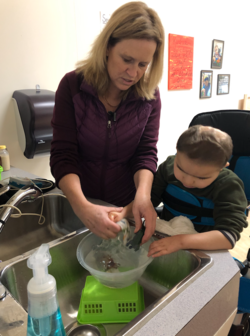The Role of the Intervenor

The Intervenor’s primary role is to ensure that each learner is an informed and active participant in every activity. Remember that Intervention = Information.
The Intervenor’s role is to provide information that an individual with deafblindness is unable to gather on their own. The process of Intervention looks different with every individual who is deafblind.
The role of the Intervenor is very complex with many components. The role may include aspects such as:
- Direct hands-on support
- Collaborating with the student's team to share information about deafblindness and Intervention
- Being a communication partner
- Ensuring the safety of the person with deafblindness
- Advocacy
- Social development and facilitating relationships (if necessary)
- Concept development
The individual aspects of Intervention can be as varied as the needs of the individual supported.
Intervention with learners who are deafblind includes the following throughout all activities. The Intervenor engages the student in:
- Developing conversation and the functional use of receptive and expressive communication.
- Making the best use of vision and hearing as well as other senses, and using all senses together to understand his or her world.
- Using both planned situations and teachable moments to develop skills and concepts, and to apply them in daily life.
- Getting feedback from his or her actions, as a basis for future decisions, motivation, development and generally making sense of things.
- Transferring skills, concepts and language to new situations in an ever-expanding environment.
- Making informed decisions, and turning decisions into effective action by the student.
- Interacting purposefully and enjoyably with people as a responsible participant in meaningful activities in the community, at school and beyond.